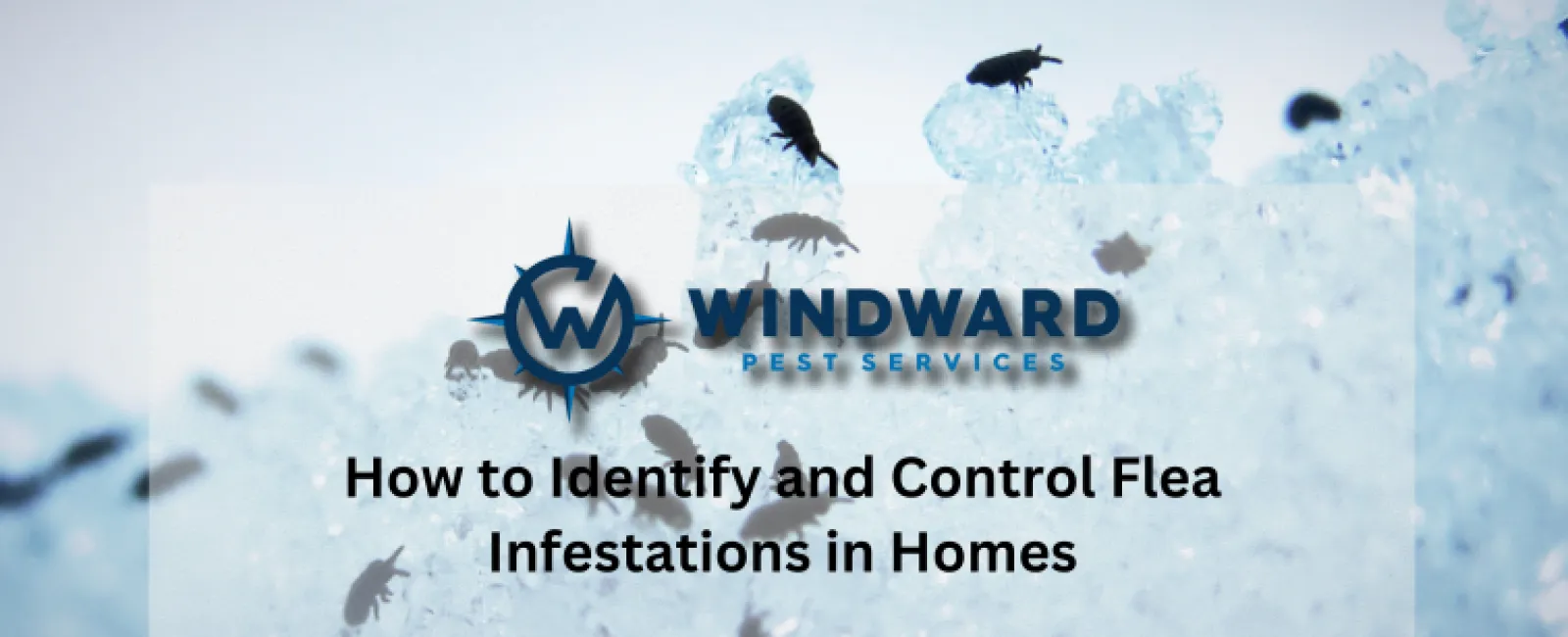Flea infestations can be a nightmare for homeowners, causing discomfort and potential health issues for both humans and pets. These tiny pests can spread quickly and are notoriously difficult to eliminate once they've established themselves in your home. Effective home pest control, including regular pest inspections for homes, is crucial to identify and control flea infestations. For residents in Atlanta, pest control services are essential to maintaining a healthy and comfortable living environment. This blog will guide you through identifying and controlling flea infestations in your home.
Understanding Fleas and Their Behavior
What Are Fleas?
Fleas are small, wingless insects that feed on the blood of mammals and birds. They have a hard, flattened body that allows them to move through fur and feathers easily. Fleas are notorious for their jumping ability, which helps them move from host to host.
Flea Life Cycle
Understanding the flea life cycle is crucial for effective control. The flea life cycle consists of four stages:
- Egg: Flea eggs are tiny, white, and often laid on the host but can fall off into the environment.
- Larva: Flea larvae are worm-like and feed on organic debris, including flea feces.
- Pupa: Flea pupae are encased in a cocoon and can remain dormant for months, making them resistant to many treatments.
- Adult: Adult fleas emerge from the pupae and seek a host to feed on.
Why Fleas Infest Homes
Fleas typically enter homes on pets but can also be brought in on clothing or by wildlife. Once inside, they can quickly spread throughout the house, hiding in carpets, furniture, and bedding.
Identifying a Flea Infestation
Signs of Flea Infestation
- Pet Scratching: One of the most common signs of a flea infestation is your pet scratching excessively. Flea bites cause itching and discomfort, leading to constant scratching, biting, and licking.
- Flea Dirt: Flea dirt, or flea feces, appears as small black or reddish-brown specks on your pet's skin or in areas where your pet rests. To confirm if it's flea dirt, place it on a damp paper towel; if it turns red, it's flea feces.
- Flea Bites: Flea bites on humans typically appear as small, red, itchy bumps, often around the ankles and legs.
- Sightings of Fleas: Seeing fleas on your pet or in your home is a clear sign of an infestation. Fleas are tiny, about 1/8 inch long, and can be seen moving through fur or jumping.
Pest Inspections for Homes
Regular pest inspections for homes are crucial for early detection of flea infestations. Professional pest control companies can conduct thorough inspections to identify the extent of the infestation and recommend effective treatment plans.
Controlling Flea Infestations
Home Pest Control Strategies
Treating Your Pets
- Flea Medications: Consult your veterinarian for the best flea prevention and treatment products for your pets. Options include topical treatments, oral medications, and flea collars.
- Flea Baths: Bathe your pets with flea shampoo to kill existing fleas. Follow up with regular grooming using a flea comb to remove fleas and their eggs.
- Flea Preventatives: Use flea preventatives year-round to protect your pets from fleas and reduce the risk of infestations.
Treating Your Home
- Vacuuming: Vacuuming is one of the most effective ways to control fleas in your home. Vacuum all carpets, rugs, and upholstered furniture, paying special attention to areas where your pets spend time. Dispose of the vacuum bag or empty the canister outside immediately to prevent fleas from escaping.
- Washing Bedding: Wash all pet bedding, human bedding, and any removable furniture covers in hot water to kill fleas and their eggs.
- Steam Cleaning: Steam cleaning carpets and furniture can help eliminate fleas at all life stages. The heat from the steam will kill fleas, larvae, and eggs.
Using Insecticides
- Flea Sprays: Use flea sprays specifically designed for indoor use to treat carpets, furniture, and pet resting areas. Follow the instructions carefully to ensure effective treatment.
- Foggers: Flea foggers, or bombs, can treat large areas but may not reach all hiding spots. Use foggers in conjunction with other treatments for best results.
- Diatomaceous Earth: Diatomaceous earth is a natural, non-toxic powder that can be sprinkled on carpets, pet bedding, and other areas to kill fleas by dehydrating them.
Professional Pest Control Services
For severe infestations, it's best to seek help from professional pest control services. Many Atlanta pest control companies offer comprehensive flea control services, including inspections, treatments, and follow-up visits to ensure complete eradication.
Preventing Future Flea Infestations
Regular Pet Care
- Consistent Flea Prevention: Use flea preventatives on your pets year-round to protect them from fleas.
- Regular Grooming: Regularly groom your pets with a flea comb to catch any fleas before they become a bigger problem.
- Routine Vet Visits: Take your pets for regular vet check-ups to monitor their health and catch any flea issues early.
Home Maintenance
- Frequent Cleaning: Maintain a clean home by vacuuming regularly, washing bedding, and keeping clutter to a minimum.
- Yard Maintenance: Keep your yard clean and free of debris where fleas might thrive. Mow the lawn regularly and trim bushes and shrubs to reduce flea habitats.
- Pest Inspections: Schedule regular pest inspections for homes to detect and address any pest issues early.
Dealing with Other Common Pests
Ant Infestations
While fleas are a significant concern, ants are another common household pest that can cause problems. Ants can contaminate food and damage property, so it's essential to address ant infestations promptly.
Signs of Ant Infestation
- Visible Ant Trails: Seeing trails of ants moving to and from food sources is a clear sign of an infestation.
- Ant Nests: Finding ant nests, which can appear as small piles of dirt or sand, indicates an active colony nearby.
- Food Contamination: Discovering ants in your pantry or kitchen indicates they are searching for food.
Controlling Ant Infestations
- Cleanliness: Keep your home clean, especially in the kitchen. Wipe down surfaces, store food in airtight containers, and dispose of garbage regularly.
- Sealing Entry Points: Seal any cracks, gaps, and holes in your home's foundation, walls, and windows to prevent ants from entering.
- Ant Baits: Use ant baits to attract and kill ants. Place baits near ant trails and nests for best results.
- Professional Pest Control: For severe ant infestations, contact pest control services for comprehensive treatment.
The Importance of Professional Pest Control
Benefits of Hiring Professional Pest Control Services
- Expertise: Professional pest control technicians have the knowledge and experience to effectively identify and treat pest infestations.
- Comprehensive Solutions: Pest control companies offer comprehensive solutions, including inspections, treatments, and follow-up visits to ensure complete eradication.
- Safety: Professionals use safe and effective methods to eliminate pests while minimizing risks to your family and pets.
- Prevention: Regular pest control services can help prevent future infestations by identifying and addressing potential entry points and habitats.
Choosing the Right Pest Control Company
When selecting a pest control company, consider the following factors:
- Reputation: Look for a company with a good reputation and positive reviews from satisfied customers.
- Experience: Choose a company with extensive experience in dealing with flea infestations and other common household pests.
- Licensed and Insured: Ensure the company is licensed and insured to provide pest control services in your area.
- Guarantee: Select a company that offers a satisfaction guarantee or warranty on their services to ensure effective results.
Flea infestations can cause significant discomfort and health issues for both humans and pets. By understanding the signs of a flea infestation and taking proactive steps to control and prevent these pests, you can protect your home and maintain a comfortable living environment. Regular pest inspections for homes and professional pest control services in Atlanta are essential for managing flea infestations and other common pests like ants.
Effective home pest control involves a combination of treating your pets, thoroughly cleaning your home, and using appropriate insecticides. Additionally, preventive measures such as regular pet care, home maintenance, and professional inspections can help keep your home pest-free.
By staying vigilant and proactive, you can successfully manage and prevent flea infestations, ensuring a healthy and comfortable home for you and your family.

